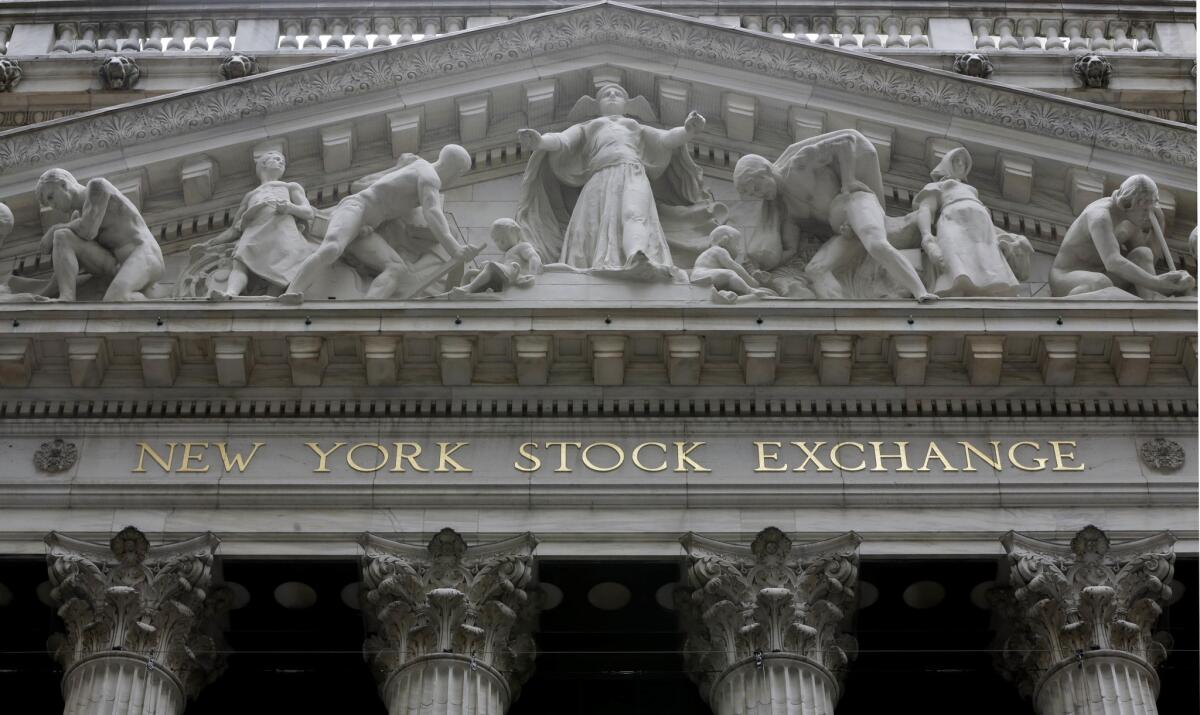Banks’ bad day drags down stock indexes, and dollar’s value drops

A bad day for bank stocks pulled the Dow Jones industrial average to its third straight loss Tuesday as many of the patterns that have propelled markets since the November election snapped into reverse.
The Dow Jones industrial average fell 58.96 points, or 0.3%, to 19,826.77, cutting into the gain it has made since Donald Trump’s surprise victory in the presidential election. The Standard & Poor’s 500 index fell 6.75, or 0.3%, to 2,267.89. The Nasdaq composite fell 35.39, or 0.6%, to 5,538.73.
The main culprit for the weakness was the financial sector, whose 2.3% drop was nearly triple that of any of the other 10 sectors that make up the S&P 500. The losses came even though Morgan Stanley on Tuesday morning joined the list of banks to report better-than-expected earnings for the fourth quarter.
One reason for the losses probably was Tuesday’s drop in bond yields. Bank stocks often have been trading in the opposite direction of bond yields, and the yield on the 10-year Treasury note fell to 2.32% from Friday’s 2.38%. Yields on two-year and 30-year Treasurys also sank.
Another reason may lie in how well bank stocks had been performing in the months earlier: Financial stocks in the S&P 500 jumped 17% in the two months after the election, more than any other sector in the index.
“You’re seeing a day where stocks that have been strong are pulling back a little bit, and investors are putting money into some of the laggards,” said Mike Barclay, senior portfolio manager for Columbia Threadneedle Investments.
Companies that sell everyday items to consumers logged the biggest gains of the day, with those in the S&P 500 up 1.3%. They’re also the ones that have struggled the most since the election.
Among them was tobacco company Reynolds American. It rose 3.1% to $57.68 after British American Tobacco said it would pay $59.64 per share in cash and stock to buy the remaining 57.8% of the company that it doesn’t already own.
Utility stocks, which have also lagged behind the overall the market since the election, did well. Those in the S&P 500 rose 1.2%, aided by the drop in Treasury yields. When bonds are paying less in interest, dividend-paying stocks become more attractive to investors who are seeking income, and utilities have some of the largest dividend yields.
NRG Energy rose 5.1% to $15.34 after an investment firm run by activist investor Paul Singer disclosed an ownership stake in the power company.
The biggest gain in the S&P 500 came from Noble Energy, which rose 7.1% to $40.05. The oil and gas company agreed to buy Clayton Williams Energy for $2.7 billion in stock and cash. Clayton Williams shares soared 39.7% to $145.25.
Qualcomm fell 4% after the Federal Trade Commission filed a complaint accusing the San Diego chipmaker of using anticompetitive tactics.
Nearly as many stocks rose on the New York Stock Exchange as fell, but the outsized losses for bank stocks were enough to drag indexes lower.
The dollar also fell against most of its rivals, including the Japanese yen, the euro and the Canadian dollar. Its sharpest drop came against the British pound, which rallied after British Prime Minister Theresa May gave a highly anticipated speech about her country’s pending departure from the European Union. One British pound bought $1.2396 as of Tuesday afternoon, up sharply from $1.2190 late Friday.
May said in her speech that Britain will make a clean break from the European Union and depart the EU’s single market. She also acknowledged for the first time that Britain’s Parliament will be able to vote on the final deal. Uncertainty about the pending divorce has shaken investors since June, when Britain voted to quit the European Union. The pound remains more than 15% weaker against the dollar than it was in June.
Benchmark U.S. crude oil rose 11 cents, or 0.2%, to $52.48 per barrel. Brent crude, used to price international oils, fell 39 cents, or 0.7%, to $55.47.
Natural gas fell a fraction of a penny to $3.412 per 1,000 cubic feet.
Gold rose $16.70 to $1,212.90 per ounce, up 1.4%. Silver rose 38 cents to $17.15 per ounce, and copper fell 1 cent to $2.63 per pound.
Overseas, Japan’s Nikkei 225 index fell 1.5%, while South Korea’s Kospi rose 0.4% and Hong Kong’s Hang Seng index gained 0.5%. The French CAC 40 fell 0.5%, and the German DAX slipped 0.1%. In London, the FTSE 100 fell 1.5%.
ALSO
American Apparel starts mass layoffs
How to fight back when an insurer denies your healthcare claim
After years of record profits, airlines face turbulence in 2017. Could higher airfares follow?
UPDATES:
2:05 p.m.: This article was updated with closing prices, context and analyst comment.
10:40 a.m.: This article was updated with market prices and context.
This article was originally published at 6:50 a.m.
More to Read
Inside the business of entertainment
The Wide Shot brings you news, analysis and insights on everything from streaming wars to production — and what it all means for the future.
You may occasionally receive promotional content from the Los Angeles Times.










